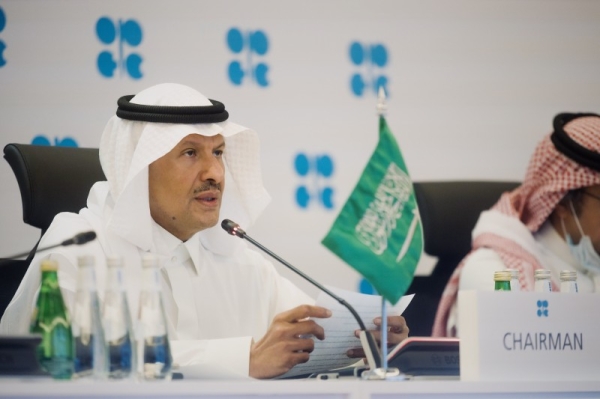

Saudi Arabia’s Minister of Energy Prince Abdulaziz Bin Salman held telephone talks on Monday with his Iraqi and Nigerian counterparts, Saudi Press Agency reported.
Prince Abdulaziz's talks with the ministers of the two other biggest oil-producing countries assume significance as they took place on the eve of a two-day joint ministerial monitoring committee meeting on the Organization of the Petroleum Exporting Countries.
The OPEC ministers are set to recommend the next level of cuts in the meeting.
The call between Prince Abdulaziz and Iraqi Minister Ihsan Abdul Jabbar Ismail focused on developments in the oil market, the improvement in global demand for oil, and progress toward implementation of the OPEC+ agreement.
At the end of the call, the Saudi and Iraqi ministers issued a joint statement, confirming their full commitment to the OPEC+ agreement.
Prince Abdulaziz commended Iraq on its performance under the agreement, whereby its conformity in June has approached 90 percent, as reported by the secondary sources.
The Saudi minister thanked his Iraqi counterpart for this achievement and expressed his confidence that Iraq would continue to improve their level of compliance.
For his part, the Iraqi minister confirmed his country’s firm commitment to the OPEC+ agreement, and added that Iraq would improve further to reach 100 percent by the beginning of next month, and pledged to compensate during the months of July, August and September, for the overproduction in May and June.
Meanwhile, the discussion with Nigerian Minister of State for Petroleum Resources Timipre Sylva focused on developments in the global oil markets, the improvement in demand for oil, and progress toward full implementation of the OPEC+ agreement.
At the end of the call, the Saudi and Nigerian ministers issued a joint statement, confirming their full commitment to the OPEC+ agreement.
Prince Abdulaziz, the chairman of the Joint ministerial monitoring committee of OPEC+, emphasized the importance for all OPEC+ participants of meeting their production stated in the agreement, in order to accelerate the rebalancing of the global oil market.
The Nigerian minister confirmed the commitment of Nigeria to the OPEC+ agreement. He clarified that his country has not yet met the terms of that agreement, and is currently below the level of the agreed cuts, as reported by the secondary sources that monitor the market.
Sylva also confirmed that Nigeria will raise its level of conformity to 100 percent, and will compensate during the months of July, August and September, for the over-production in May and June.
At the end of the talks, all three ministers stressed that efforts by OPEC+ countries toward meeting production cuts as stated in the agreement will strengthen stability and help achieve a rebalancing in global oil markets.greement will strengthen stability and help achieve a rebalancing in global oil markets.
|